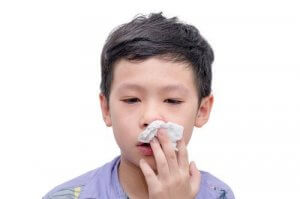My Child Suffers from Frequent Nosebleeds: What Should I Do?

Many concerned parents take their children to the pediatrician when they suffer from frequent nosebleeds. Although seeing blood always startles parents, nosebleeds shouldn’t alarm them.
Children up to age 10 often suffer from frequent nosebleeds. They can have them two to three times a week and, although it’s alarming, it usually doesn’t indicate any pathology.
In this regard, you should also know that sometimes blood can come from the back of the nose, making children swallow it and causing vomiting.
Causes of frequent nosebleeds in children
There are several reasons why children can have frequent nosebleeds. These are some of the most common ones:
- Allergies or colds. When this happens, the nasal cavities become inflamed and irritated, which can cause the blood vessels in the nose to dilate and burst, leading to minor to moderate bleeding.
- Blows. When children are playing, they may get hit with a ball or take an accidental kick to the face, causing their nose to bleed. The same happens when they put an object or fingers into their nostrils, as they can injure their nose.
- Overly dry environments. If you live in an area with an overly dry climate, keep in mind that your child’s airways can become dry and be more likely to bleed. If this is your case, keep a humidifier at home, as it’ll be really helpful.
- Inhalation of toxic products. You have to be very careful with this, since toxic products not only could cause nosebleeds but also irritate your child’s respiratory system. Make sure to keep your children away while you’re cleaning with abrasive products and be careful not to store bleach, detergent, and cleaners within their reach.

Other things to consider
- If your child suffers from frequent nosebleeds, you should rule out any anatomical problem, as it could be hindering correct functioning.
- Your child may have some kind of benign malformation or polyps that should be immediately treated. This way, you avoid possible complications and help the nosebleed stop.
- You also have to check your child’s blood clotting. Some diseases alter the blood’s condition. Also, some drugs can cause bleeding in the nasal passages.
What to do if your child suffers from frequent nosebleeds
- Now you know that this problem is usually no cause for concern. Therefore, you should stay calm when your child’s nose starts to bleeds to avoid frightening him or her.
- Just tilt your child’s head slightly forward and tell him to delicately blow his nose.
- Hold the soft part of your child’s nose, right in the middle, for 10 minutes. After that time, stop holding it. Repeat again if the bleeding hasn’t stopped.
- If the bleeding continues after doing this, go to a community health center.
When you should take your child to the doctor
In some situations, you should take children to the pediatrician when they have a nosebleed:

- If your child loses a lot of blood and the nosebleed doesn’t stop after applying the maneuver we explained above.
- When your child vomits something other than blood and coughs too much.
- If your child loses consciousness or is pale and sweaty.
- Also, maybe one of your child’s blood vessels are too small and bursts easily. If this is your child’s case, the doctor may stop the bleeding with silver nitrate.
As you can see, the causes of frequent nosebleeds are quite common: colds, allergies, blows, and some children’s propensity to sticking things in their nose. You have to convey to your child that there’s nothing to be scared of, as this can help him or her feel better.
Many concerned parents take their children to the pediatrician when they suffer from frequent nosebleeds. Although seeing blood always startles parents, nosebleeds shouldn’t alarm them.
Children up to age 10 often suffer from frequent nosebleeds. They can have them two to three times a week and, although it’s alarming, it usually doesn’t indicate any pathology.
In this regard, you should also know that sometimes blood can come from the back of the nose, making children swallow it and causing vomiting.
Causes of frequent nosebleeds in children
There are several reasons why children can have frequent nosebleeds. These are some of the most common ones:
- Allergies or colds. When this happens, the nasal cavities become inflamed and irritated, which can cause the blood vessels in the nose to dilate and burst, leading to minor to moderate bleeding.
- Blows. When children are playing, they may get hit with a ball or take an accidental kick to the face, causing their nose to bleed. The same happens when they put an object or fingers into their nostrils, as they can injure their nose.
- Overly dry environments. If you live in an area with an overly dry climate, keep in mind that your child’s airways can become dry and be more likely to bleed. If this is your case, keep a humidifier at home, as it’ll be really helpful.
- Inhalation of toxic products. You have to be very careful with this, since toxic products not only could cause nosebleeds but also irritate your child’s respiratory system. Make sure to keep your children away while you’re cleaning with abrasive products and be careful not to store bleach, detergent, and cleaners within their reach.

Other things to consider
- If your child suffers from frequent nosebleeds, you should rule out any anatomical problem, as it could be hindering correct functioning.
- Your child may have some kind of benign malformation or polyps that should be immediately treated. This way, you avoid possible complications and help the nosebleed stop.
- You also have to check your child’s blood clotting. Some diseases alter the blood’s condition. Also, some drugs can cause bleeding in the nasal passages.
What to do if your child suffers from frequent nosebleeds
- Now you know that this problem is usually no cause for concern. Therefore, you should stay calm when your child’s nose starts to bleeds to avoid frightening him or her.
- Just tilt your child’s head slightly forward and tell him to delicately blow his nose.
- Hold the soft part of your child’s nose, right in the middle, for 10 minutes. After that time, stop holding it. Repeat again if the bleeding hasn’t stopped.
- If the bleeding continues after doing this, go to a community health center.
When you should take your child to the doctor
In some situations, you should take children to the pediatrician when they have a nosebleed:

- If your child loses a lot of blood and the nosebleed doesn’t stop after applying the maneuver we explained above.
- When your child vomits something other than blood and coughs too much.
- If your child loses consciousness or is pale and sweaty.
- Also, maybe one of your child’s blood vessels are too small and bursts easily. If this is your child’s case, the doctor may stop the bleeding with silver nitrate.
As you can see, the causes of frequent nosebleeds are quite common: colds, allergies, blows, and some children’s propensity to sticking things in their nose. You have to convey to your child that there’s nothing to be scared of, as this can help him or her feel better.
All cited sources were thoroughly reviewed by our team to ensure their quality, reliability, currency, and validity. The bibliography of this article was considered reliable and of academic or scientific accuracy.
- Materno-infantil, S. (2010). Salud materno-infantil 10. In END 2010. https://doi.org/10.4067/S0370-41061973000600011
- ENDES. (2015). Encuesta Demográfica y de Salud Familiar. abril. https://doi.org/10.1007/s13398-014-0173-7.2
This text is provided for informational purposes only and does not replace consultation with a professional. If in doubt, consult your specialist.








